Select Language
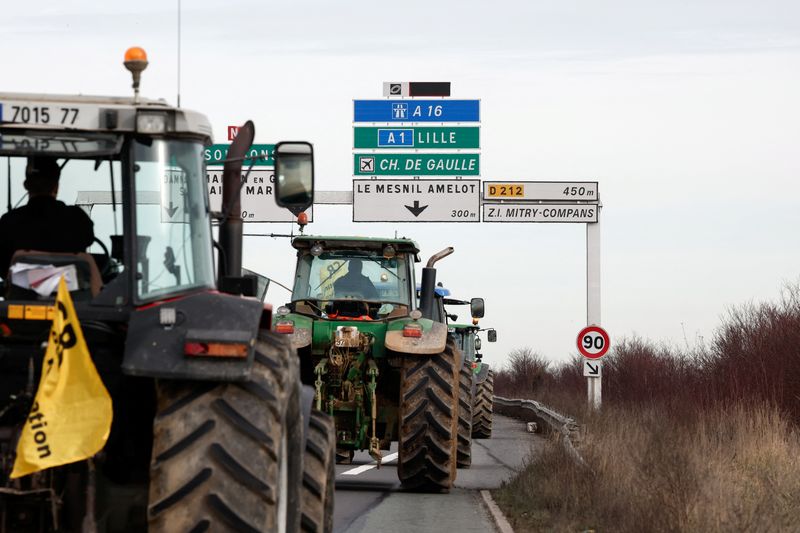
PARIS (Reuters) -French farmers maintained nationwide protests on Saturday and kept their threat of roadblocks around Paris, arguing government measures to quell the demonstrations did not go far enough to meet their demands for better pay and living conditions.
On Friday, Prime Minister Gabriel Attal's government dropped plans to gradually reduce state subsidies on agricultural diesel, and announced other steps aimed at reducing the financial and administrative pressures faced by many farmers.
Yet the FNSEA, France's biggest farming union, said it would keep up its protests and many farmers remained at roadblocks set up by motorways and major roads on Saturday.
"On Monday, we will be heading for Paris," farmer Vincent Gimneste told BFM TV, at a roadblock in southern France.
Two local farmers trade unions representing those working in the countryside around Paris also told French media they were targeting causing major disruption in the capital on Monday, possibly around the Rungis food market.
Prime Minister Gabriel Attal will visit a farmers' site on Sunday, said Attal's office, as the government tries to prevent the protests from gaining in momentum.
Demonstrators also held a silent march in the northern French town of Beauvais on Saturday, to pay tribute to farmers who have died in recent years, with some having committed suicide due to the stress of their working conditions.
France is the European Union's biggest agricultural producer and the French farmers' protests follow similar action in other European countries such as Germany and Poland, with many demonstrators saying they are being hit by globalisation and foreign competition.
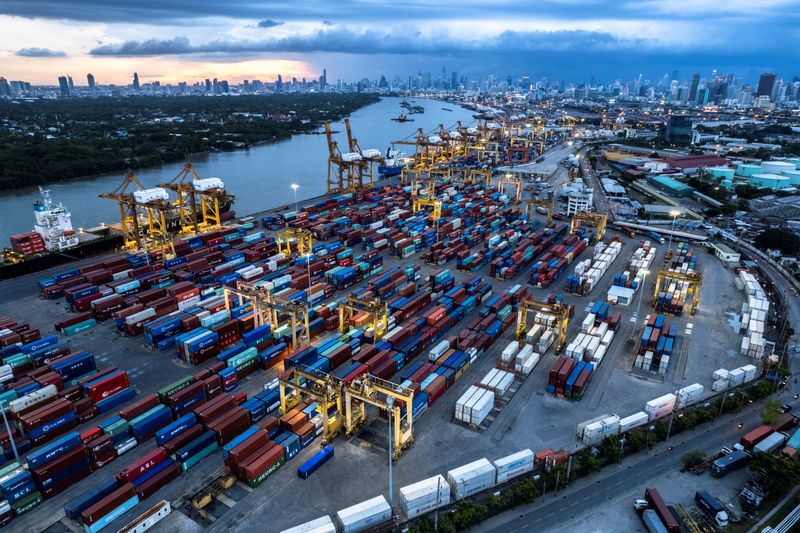
BANGKOK (Reuters) - Thailand's economy is in a state of recession owing to a high level of household debt, a deputy finance minister said on Monday, reiterating the need for stimulus to jumpstart the economy.
Deputy Finance Minister Julapun Amornvivat said the government was committed to delivering on its signature 500 billion baht ($14.05 billion) handout plan of transferring 10,000 baht to 50 million Thais, and hoped a delay in its rollout would not be long.
The government last week slashed 2024 growth projections for Southeast Asia's second-largest economy to 2.8% from an earlier forecast of 3.2% on weaker exports and lower foreign tourist numbers.
It also lowered the 2023 growth estimate to 1.8% from 2.7%. That compared to growth in 2022 of 2.6%.
"If you ask, now it's at the dangerous level. It's a kind of economic recession," Julapun told reporters.
"This is caused by a situation where the household debt burden is high. People's debt burden is high, private sector debt burden is high."
He added: "It's difficult to drive the economy forward. That's why we've seen economic growth that has always been sluggish."
Julapun also said Thailand is planning to issue bonds overseas in the next one or two years in dollar, yuan and yen.
He said there would be a sale of government savings bonds worth about 100 billion baht ($2.81 billion) in the 2024 fiscal year, with the first batch in march. ($1 = 35.59 baht)
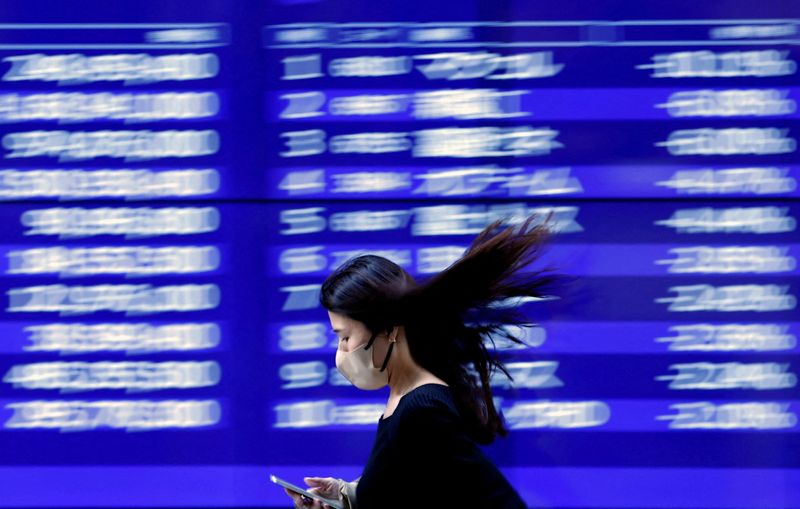
By Kevin Buckland
TOKYO (Reuters) - Chinese equities led a rally in Asian stocks to start the week, after regulators took new steps over the weekend to support the market.
Oil climbed after a step-up in Middle East violence, as a missile attack by Yemen's Houthi group caused a fire on a fuel tanker in the Red Sea, while three U.S. troops were killed after a drone attack in Jordan.
The dollar and U.S. Treasury yields hovered in the middle of recent ranges ahead of a highly anticipated Federal Reserve policy meeting later in the week.
Hong Kong's Hang Seng jumped 1.4%, and a sub-index of mainland property shares surged 3.6% after China's securities regulator said on Sunday that it will fully suspend the lending of restricted shares.
Regional stocks had already started the day on a firm footing, but extended gains after the Hong Kong open, with Japan's Nikkei gaining 0.8% and South Korea's Kospi advancing 1.2%, while Australia's stock benchmark added 0.4%.
Mainland China blue chips, however, were little changed after seesawing in early trade.
U.S. stock futures pointed 0.1% lower after the S&P 500 slipped 0.07% on Friday to snap a five-day streak of setting fresh all-time closing highs, although it marked a new intraday record during that session.
The backdrop for that was a continued moderation in consumer inflation in Friday's data, which added to the narrative for Fed rate cuts in coming months, but also suggested policy makers had little pressure to rush.
Markets expect the Fed to keep policy steady on Wednesday, but will be hunting for clues on when a first rate cut might come. Economists mostly predict June, but traders are pricing the risk of a March move at essentially a coin toss, according to CME Group's (NASDAQ:CME) FedWatch Tool.
The U.S. dollar index, which tracks the currency against six major peers, was content to stick to the middle of its range of the past two weeks at 103.52, little changed from Friday.
Long-term Treasury yields declined about 3 basis points to 4.1316%, putting them near the centre of their range since Jan. 18.
Last week's U.S. data continued the "remarkable run" of not-too-hot and not-too-cold economic indicators, pointing to a soft landing and a May start to policy easing, Commonwealth Bank of Australia (OTC:CMWAY) strategists wrote in a client note.
Odds for a March move should continue to be priced out this week, leading the dollar index to test 104 and bond yields to rise "modestly," they said.
The dollar was little changed at 148.06 yen on Monday, while the euro was flat at $1.08465 and sterling was steady at $1.27055.
In energy markets, Brent crude futures climbed 83 cents to $84.38 a barrel and U.S. West Texas Intermediate crude CLc1 rose 78 cents to $78.79 a barrel.
Gold added 0.23% to $2,023.39.
Cryptocurrency bitcoin ticked up to $42,165.
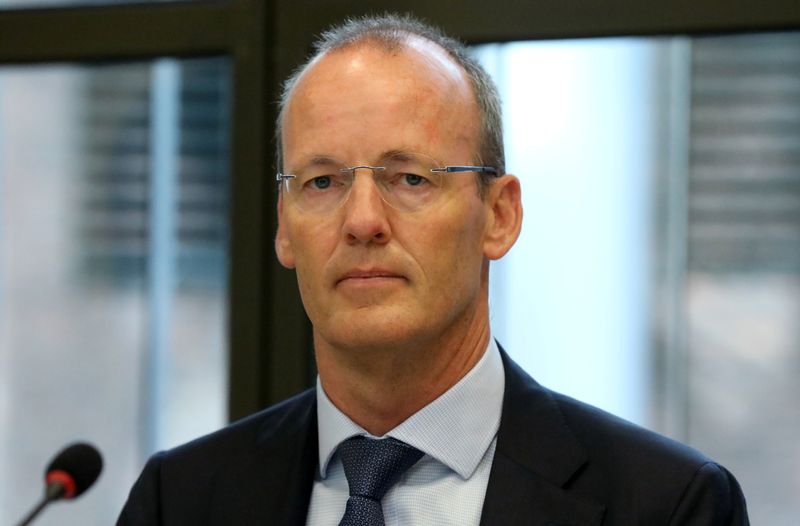
AMSTERDAM (Reuters) - The European Central Bank (ECB) will need to see proof of slowing wage growth in the euro zone before interest rates can be lowered, ECB governing council member Klaas Knot said on Sunday.
"We now have a credible prospect that inflation will return to 2% in 2025. The only piece that's missing is the conviction that wage growth will adapt to that lower inflation", the Dutch central bank governor said in an interview with Dutch TV program Buitenhof.
"As soon as that piece of the puzzle falls in place, we will be able to lower interest rates a bit."
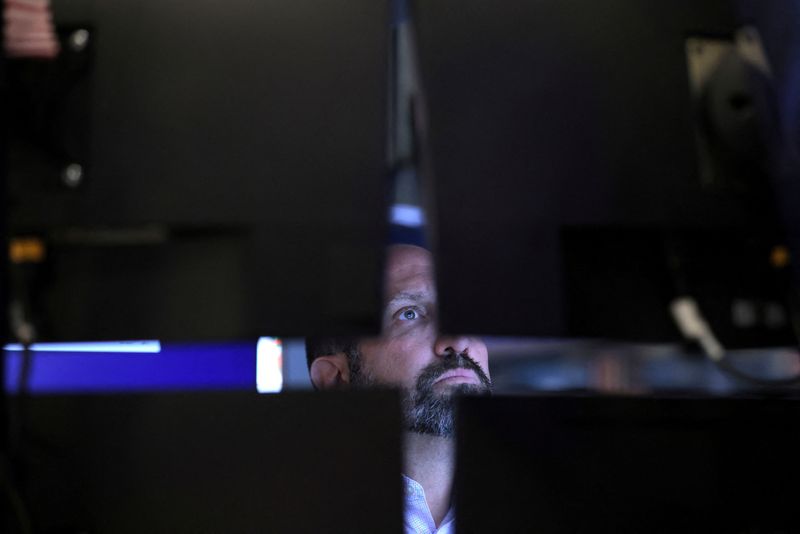
Investing.com -- It’s set to be an action-packed week in markets with the Federal Reserve’s first meeting of the year, a flurry of big tech earnings and the latest U.S. jobs report. The Bank of England also holds its first policy meeting of 2024 while data out of China is expected to remain gloomy. Here’s what you need to know to start your week.
Fed ahead
The Fed is widely expected to keep interest rates unchanged on Wednesday with investors eagerly awaiting any indication that officials believe they have progressed enough in their battle against inflation to begin cutting rates sooner rather than later.
Investors have pushed expectations for the Fed’s first rate cut to May from March following recent strong economic data and statements from Fed officials that suggested that cuts may not be as aggressive as expected.
Data on Friday indicated that inflation is moderating but consumer spending remains robust, leading to concerns that price pressures could begin to mount again.
Investors will be closely watching Fed Chair Jerome Powell’s post policy meeting press conference for any insights into how officials have been interpreting recent economic data.
Jobs report
Hard on the heels of the Fed decision the U.S. is to release the January jobs report on Friday, with the economy expected to have added 177,000 new jobs, slowing from 216,000 the prior month.
The recent stock market rally which has powered the S&P 500 to record highs has been driven by expectations of a U.S. economic “soft-landing” in which growth remains stable while inflation cools.
A weaker than expected reading could indicate that the 525 basis points of rate increases delivered by the Fed since 2022 are finally starting to bite, while stronger-than-expected hiring could bolster the case for the central bank to keep rates higher for longer.
The economic calendar also includes data on JOLTS job openings and consumer confidence on Tuesday, followed a day later by a report on private sector payrolls and weekly data on initial jobless claims on Thursday.
Megacap earnings
Earnings will be a major focal point in the week ahead with five of the massive “Magnificent Seven” growth and technology stocks that have powered markets higher for much of the last year reporting.
Alphabet (NASDAQ:GOOGL) and Microsoft (NASDAQ:MSFT) are due to report results on Tuesday, followed by Apple (NASDAQ:AAPL) and Amazon (NASDAQ:AMZN) on Thursday with Meta Platforms (NASDAQ:META) closing out the week on Friday.
With the S&P 500 officially in a bull market, the Magnificent Seven's results will be crucial in determining whether the index can maintain its momentum.
Collectively, the market capitalization of Alphabet, Microsoft, Apple, Amazon and Meta account for nearly 25% of the S&P 500, giving them an outsize influence on the performance of the broader index.
"There’s not this monolithic performance among those stocks anymore," said Liz Ann Sonders, chief investment strategist at Charles Schwab told Reuters. "If there is a downside to earnings … that could take the bloom off the rose" for the market as a whole.
Bank of England
The BoE is expected to keep interest rates on hold on Thursday and while it may drop its long-held warning that it will hike rates again if inflation rebounds it is expected to indicate that rates need to remain restrictive for an extended period.
The latest U.K. jobs report showed that wage growth rose at the slowest pace in almost a year in the three months to November, but inflation unexpectedly rose to 4% in December.
Britain's economy started 2024 on a stronger footing but data last week indicated that supply disruptions in the Red Sea are reigniting inflation in the manufacturing sector.
The BoE raised interest rates 14 times between December 2021 and August 2023, taking rates to a peak of 5.25% after inflation surged to a 41-year high of 11.1% in late 2022.
China PMIs
China is to release official purchasing managers' index (PMI) data on Wednesday that is likely to show that the world’s second largest economy remains on a shaky footing.
China's economy expanded by 5.2% in 2023, but its post-pandemic recovery has been shaky, with a protracted housing downturn, mounting deflationary risks and slowing global growth casting clouds over the outlook for this year.
China's central bank announced last Wednesday that it was making a 50-basis point cut to bank reserves, the biggest in two years, sending a strong signal of support for a fragile economy and the country's plunging stock markets.
Still, analysts say more stimulus is needed this year to get economic activity on more solid footing.
--Reuters contributed to this report

A look at the day ahead in European and global markets from Kevin Buckland
The feel-good factor that lifted stocks overnight fizzled on Friday, with neither gains on Wall Street - including another record for the S&P 500 - nor the afterglow of China's deep cuts in bank reserve requirements able to keep Asian stocks afloat.
Mainland and Hong Kong-listed shares started the day with a slight pop higher but quickly turned lower, while Japan's Nikkei erased the last of the gains for the week that had taken it to a 34-year peak on Tuesday.
Enthusiasm was drained by events on Wall Street after the close. Intel (NASDAQ:INTC)'s underwhelming revenue forecasts pushed its stock some 10% lower in extended trading, and Asian semiconductor shares toppled like dominoes.
The Nikkei's four worst-performing shares were all from the chip sector. The Hang Seng's high-tech subindex slipped 2.65%. That doesn't bode well for European tech shares.
But there are policy-driven undercurrents affecting Asian shares as well.
There's been a slow-burn repricing of Japanese risk after the Bank of Japan's hawkish tilt on Tuesday.
And in China, where policy measures have so far been sporadic and disappointing, it's been state-backed stock buying and restrictions on short-selling that are supporting markets, as much as any optimism over potential stimulus measures.
A handful of noteworthy earnings reports are due later in the day from Scandinavia, including Sweden's Volvo, but the European data calendar is light, consisting mainly of consumer sentiment readings from Germany and France.
The weekend invites some profit taking, particularly with the week ahead bringing financial results from the giants of U.S. tech - Apple (NASDAQ:AAPL), Microsoft (NASDAQ:MSFT), Amazon (NASDAQ:AMZN), Alphabet (NASDAQ:GOOGL) and Meta Platforms (NASDAQ:META) - not to mention a Federal Reserve meeting and the always influential monthly jobs report.
But the MSCI world index, up more than 1% for the week so far, still looks likely to manage a third straight weekly gain by the time of Wall Street's closing bell, despite Asia's disappointing start.
Key developments that could influence markets on Friday:
-Germany GfK Consumer Sentiment (Feb), France Consumer Confidence (Jan)
-Earnings from Volvo AB (OTC:VLVLY), Telia (ST:TELIA) Company AB, Sartorius AG
(By Kevin Buckland; Editing by Edmund Klamann)

By David Morgan and Richard Cowan
WASHINGTON (Reuters) -Bipartisan U.S. Senate talks on a border security deal that some have set as a condition for further Ukraine aid have hit a critical point, lawmakers said on Thursday, though the chamber's top Democrat said the negotiators would continue to push forward.
A small group of senators has spent months trying to iron out an agreement to address the flow of migrants across the U.S.-Mexico border. But the effort has recently encountered growing opposition among Republicans aligned with Donald Trump, the frontrunner for their party's presidential nomination.
"We're at a critical moment, and we've got to drive hard to get this done. And if we can't get there, then we'll go to Plan B," Senator John Thune, the chamber's No. 2 Republican, told reporters in the U.S. Capitol.
"For now, at least, there are still attempts being made to try and reach a conclusion that would satisfy a lot of Republicans," Thune added.
A source familiar with the talks said negotiators were trying to "revive" the effort by altering the legislation to bolster its appeal to Senate conservatives.
"I am glad that now negotiations are continuing to move forward. Of course there are still issues that must be settled, but negotiators will work all weekend in an effort to get this done," Senate Democratic leader Chuck Schumer said.
Senate Republican leader Mitch McConnell and other top party members, including Thune, want a border deal that can win support from most Senate Republicans, in hopes of prompting the Republican-controlled House of Representatives to take up the measure combining border security with aid for Ukraine, Israel and Taiwan.
House Republicans have urged Republican Speaker Mike Johnson to accept only the provisions of partisan border legislation called HR-2, which Democrats reject as draconian.
McConnell has been the most prominent Republican advocate for additional U.S. aid to Ukraine to help it fight off Russia's invasion, even as a growing number of his party in the House and Senate express skepticism about the value of spending more to help an ally. It was not clear what path McConnell might take on foreign aid if a border deal failed.
But Republicans aligned with Trump have become more voluble in their skepticism since the former president took to social media to warn against any deal that fails to deliver everything Republicans want to shut down border crossings.
The White House has said there was no reason for bipartisan border talks in the Senate not to continue.
"We need to come together on (a) common sense compromise on border measures and border policy and border resources. And we still are hopeful that that can happen," White House spokesperson Olivia Dalton said.
A DEAL NEXT WEEK?
Punchbowl News reported that McConnell told Republicans in a private meeting that the time and political will to pass a bipartisan border deal were running out, and that Republicans should not undermine Trump's intention to focus his White House campaign on immigration.
But Senator Thom Tillis, a North Carolina Republican who attended the meeting and has been involved in some of the negotiations, said it was "patently false" that McConnell had changed course.
McConnell emphasized his commitment to a border deal and Ukraine aid during a Republican lunch on Thursday, according to lawmakers who attended.
"He's not going to let political considerations of any campaign stand in the way of his support," Republican Senator Mitt Romney said.
McConnell did not comment to reporters as he exited the lunch.
More than half of the 49 Senate Republicans have endorsed Trump, and many want the conference to reflect the former president's positions on major issues, including the border.
"Republicans should pay very close attention to the position that President Trump adopts regarding the border," said Republican Senator Bill Hagerty.
Senator Chris Murphy, the Democratic lawmaker in the negotiations, said Republicans will have to decide whether to accept a border deal that has yet to be finalized.
"We have produced the compromise that they (Republicans) asked for, with the chosen negotiator that they appointed, and it is now up to them as to whether they want to accept the agreement," the Connecticut lawmaker told reporters.
Another negotiator, independent Senator Kyrsten Sinema, told KGUN-TV in Tucson that she expects the text of a deal to be released "early next week."
Republican Senator Todd Young said it would be a mistake to give up on the issue now by taking negotiations off the table to "pay fealty to short-term considerations."
"I don't believe we should take this off the table, certainly not to clear the way for a clean campaign debate season," Young told reporters. "Let's get something consequential done for the American people."
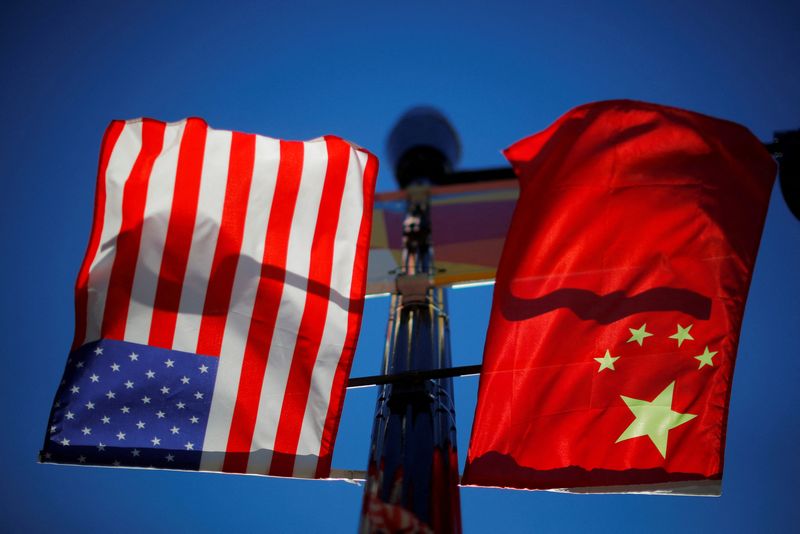
By Jamie McGeever
ORLANDO, Florida (Reuters) -A gradual financial disentangling of China and the United States after decades of symbiosis may reduce fears of 'mutually assured financial destruction' but also harden divisions in an increasingly polar global economy.
Whether one or the other suffers more from that separation is under the microscope right now. But the mutual threat - especially China's U.S. bond holdings - looks far less potent than once assumed.
Since China's return to the global economic stage in 2000, the wave of U.S. corporate and banking investment in the country was seemingly matched by China banking windfall savings from the resulting export and growth boom back into U.S. Treasury bonds.
Channeling the old Cold War thesis of a stable nuclear arms rivalry, some saw 'MAFD' and the resulting inter-dependence as binding the two together and preventing any sudden fracture in the economic relationship.
The circular thinking was that any political standoff that disturbed those investment flows would be so devastating to both in the highly integrated world economy that they would always step back from the brink.
But that's not quite how it has panned out.
Following the trade wars of late 2010s, the pandemic shock and geopolitical rifts surrounding Ukraine and Taiwan, both sides have substantially reduced their respective financial footprints in the other. "Derisking," in Washington parlance.
While its debatable to what extent China's current deep market disturbance is related to the rapid retreat of U.S. corporate and banking investment over the past two years, China's hold on the U.S. bond market has loosened too.
The latest figures show China held $782 billion of Treasuries in November - a large amount, but also around its smallest in 15 years and down significantly from the peaks of $1.3 trillion in 2011 and 2013.
More importantly, China's footprint in the U.S. bond market is a fraction of what it once was. China owns less than 3% of all outstanding Treasuries, the smallest share in 22 years, and again substantially down from the record 14% in 2011.
Granted, China also likely holds Treasuries via other countries like Belgium. And an estimated 60% of China's $3.24 trillion foreign reserves is in other dollar-denominated assets like agency bonds, shorter-term bills, and bank deposits.
But Beijing's influence over the U.S. bond market has waned.
"China's holdings are large enough that selling could in theory be very disruptive, although its hold over the market is not what it was relative to the past," notes Alan Ruskin, macro strategist at Deutsche Bank.
"But China has not shown any desire to be a disruptive force in this regard."
DECOUPLING
China is not alone. The rise in overseas holdings of Treasuries to all-time highs of around $6.8 trillion is down to the private sector - global official holdings have fallen to a 12-year low around $3.4 trillion.
The Treasury market is now a $26 trillion beast, twice as large as it was eight years ago and five times its size before Lehman Brothers collapsed in 2008.
But China has steadily lagged its central bank peers, and Beijing's share of all Treasuries owned by the official sector is now 21%. That's the lowest since 2005, and well below the peak of 37.5% in 2011.
There are signs that outright selling as well as valuation adjustments is shrinking China's Treasuries portfolio.
Deutsche Bank's Ruskin estimates that China sold $15 billion in November, taking net selling over the last 12 months to $65 billion, flows that will support the notion that China is "decoupling from a key financial linkage with the US."
GO WITH THE FLOW
It is difficult to accurately track bilateral U.S.-China capital flows. Chinese companies list on non-Chinese exchanges, U.S. investors funnel funds into China via offshore financial centers, and there is the huge difference in liquidity and accessibility of Chinese 'A' shares and 'H' shares.
But broad measures suggest the decoupling is going both ways.
In the first nine months of last year U.S. investors sold a net $1.76 billion of Chinese financial assets, according to official U.S. quarterly balance of payments data. That was largely driven by equity selling.
In calendar year 2022 they sold a net $9.5 billion of Chinese assets and the year before that they sold a whopping $67 billion. Both were driven by powerful equity outflows.
U.S. companies have been pulling money out of China too.
Official U.S. balance of payments data show that a net $5.6 billion of direct investment flowed back to the United States in the first nine months of last year, and in calendar year 2022 that flow totaled $12 billion.
This tallies with China recording an $11.8 billion deficit in foreign direct investment in the third quarter last year, its first ever FDI deficit with the rest of the world. That was a marker.
The United States and China start 2024 on very different financial and economic footings - the S&P 500 is at a record high; U.S. market outperformance over Chinese stocks is yawning; nominal U.S. GDP growth last year was probably higher than China's; global money is flooding out of China and into America.
As their financial co-dependence diminishes, China appears to be the more vulnerable of the two. Not what everyone would have predicted 20 years ago.
(The opinions expressed here are those of the author, a columnist for Reuters.)
(By Jamie McGeever; Editing by Andrea Ricci)
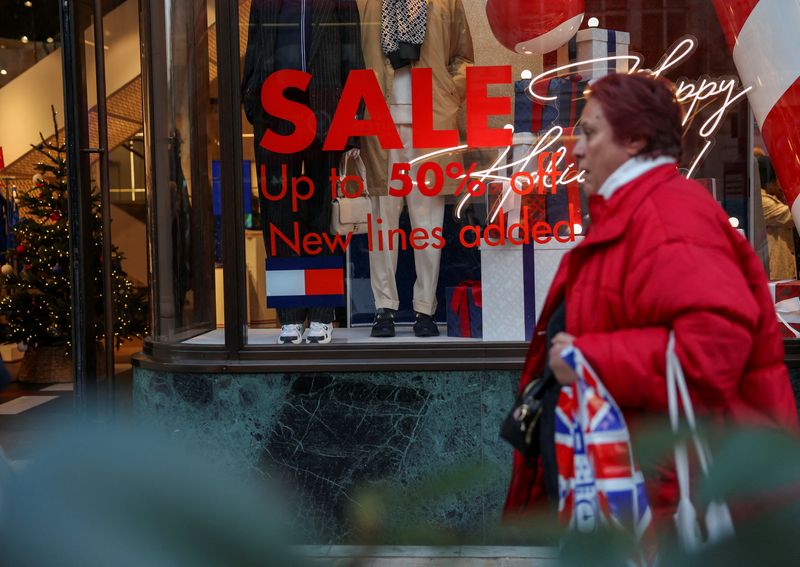
By Suban Abdulla
LONDON (Reuters) - British consumers are their most confident since January 2022 as lower inflation helped them to feel better about their finances, a survey showed on Friday, welcome news for Prime Minister Rishi Sunak before a national election expected this year.
The GfK consumer confidence index rose to -19 in January from -22 in December. A Reuters poll of economists had forecast a slightly smaller improvement to -21.
"Despite the cost-of-living crisis still impacting many households across the UK, consumers appear to be encouraged by the positive news about falling inflation," Joe Staton, client strategy director at GfK said.
Sunak, who has suggested he will hold a national election in the second half of 2024, has promised to voters that he will get the economy growing again.
While British inflation unexpectedly rose to 4% in December, denting investors' hopes of quick interest rate cuts by the Bank of England, it is well below its peak of 11.1% in October 2022.
The BoE is expected to hold its main Bank Rate at a nearly 16-year high of 5.25% next week after 14 consecutive increases between December 2021 and August 2023 but analysts are expecting a signal that the time for rate cuts might be approaching.
GfK said all five of its confidence gauges rose in January with the outlook for personal finances in the next 12 months out of negative territory for the first time in two years with a reading of zero.
"This significant change is the best single indicator for how the nation's households feel about their income and expenditure," Staton said.
A measure of how consumers view the economy over the next 12 months increased by four points to -21.
Friday's survey contrasted with official data published last week, which showed the biggest fall in retail sales for nearly three years in December, raising the risk that the economy slipped into recession in late 2023.
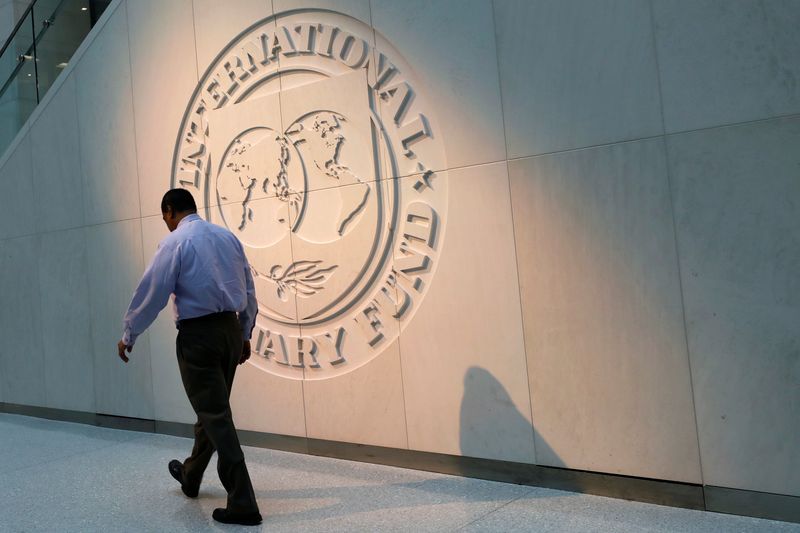
By Andrea Shalal
WASHINGTON (Reuters) - The International Monetary Fund still favors a case-by-case approach to dealing with sovereign debt issues, but is closely monitoring developments to ensure it is prepared if a more systemic approach is needed, a top official said on Thursday.
IMF strategy chief Ceyla Pazarbasioglu said the global outlook called for "relatively higher and more volatile interest rates" that would not be conducive to emerging markets being able to reduce their high debt burdens.
Pazarbasioglu said there had not been major solvency problems in emerging markets or developing countries in recent months, but she remained concerned that record global public debt and high debt servicing costs were crowding out investment in education, infrastructure or climate resilience.
The IMF official said the Group of 20 common framework for debt restructuring had helped support countries that needed debt relief, but "much more" needed to be done, including quicker and more predictable relief reaching a broader set of countries.
Creation of the Global Sovereign Debt Roundtable, which also includes the private sector and the borrowing countries, marked another step forward, but some economists questioned whether a more systemic approach was needed.
For now, the IMF favored a case-by-case approach, she said, but added that piloting some other approaches would be very important going forward.
"So in our view, we are not yet there to need some sort of a systemic approach that was used in the past. But we are monitoring the developments very carefully to make sure that we are prepared in case such approaches would be necessary," she added.
Pazarbasioglu said the median external debt service burden of emerging market countries - a key indicator for assessing whether a country might be at risk of missing a debt payment - was now about 11% of revenues, compared to 8% a decade ago.
The number was far higher for low-income countries, which spent about 14% of revenues to service their debts, up from 6% in 2013, she said.
In a separate blog published this week, the IMF said the overall funding squeeze facing low-income countries should be monitored carefully, noting that they needed to refinance about $60 billion of external debt each year, three times the average seen in the decade through 2020.
Given climate change challenges, there was a "significant risk of a liquidity crunch" which could lead to a destabilizing debt crisis, they wrote.

